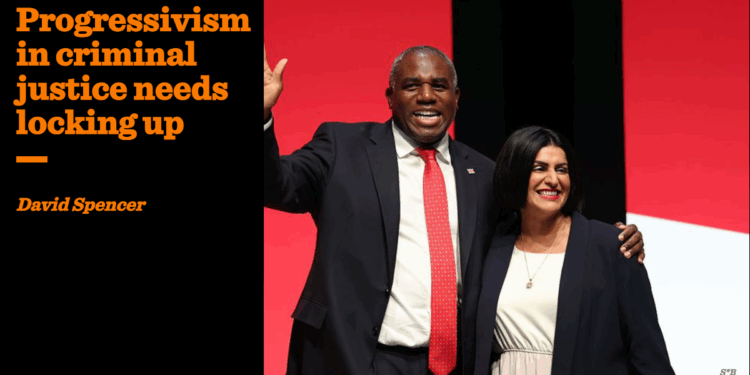Many have commented on Shabana Mahmood’s promotion to Home Secretary. Far fewer are discussing the shift of David Lammy to the Ministry of Justice. Together, these two appointments expose a deep tension at the top of Government.
Over the last decade, Lammy has been one of the most prominent advocates of ideological “progressivism” in the criminal justice system. Mahmood, meanwhile, as his predecessor as Lord Chancellor, only a few months ago took the Sentencing Council to task over two-tier sentencing guidelines — guidelines rooted in Lammy’s own Independent Review into sentencing policy, commissioned in a very different era when Michael Gove served as Justice Secretary.
Gove’s short period as Justice Secretary leaned notably into “progressivist” ideology. Yet in his previous role as Secretary of State for Education, Gove led the transformation of English schools, with a laser-sharp aim being taken at idealistic “educational progressivism”.
Barely a week goes by where we are not confronted by yet more crushing evidence of police forces and the wider criminal justice system failing to serve the law-abiding majority. The latest crime figures show there is a “property” crime wave. In the last year alone shoplifting was up 20 per cent and “theft person” crimes were up 50 per cent. As Policy Exchange recently reported, Judges are more likely to sentence even the most prolific offenders to a non-custodial sentence rather than a term of imprisonment. The police seem to prioritise arresting a comedy writer for tweets over tackling crime on the streets.
At the root of the crisis we face in policing and the wider criminal justice system, is a “progressivist” ideology which stems from the same impulses that underpinned progressivism in education — and is doing no less harm on our streets than it did in our schools.
Derived from political progressivism, the policing and criminal justice version is an ideology which has been embedded as the orthodoxy across the political parties in Westminster and with civil servants, police chiefs, the judiciary, prosecutors and prison governors. Although initially barely noticed by the public, over the last two decades it has led to nothing less than a revolution in how crime and criminals are treated in this country.
To get a grip in the fight against crime and criminals, only a counter-revolution will suffice in response.
There are four key tenets to progressivism in policing and criminal justice.
First, crime is predominantly blamed on the “system” rather than the individual. Instead of criminals being recognised as the principal cause of crime, external factors are blamed: poverty, racism or a poor upbringing perhaps. These “systemic” factors are then presented as the real problem to be tackled. It is such a mindset which leads to even the most prolific criminals being returned to the neighbourhoods they immiserate having been sentenced to yet another in their collection of “rehabilitative” community sentences.
Second, mercy for the guilty is prioritised over justice for the innocent. Prison and sentencing policy is dominated by a sort of “Prison Reform Industrial Complex” — a small group of charities and individuals who operate in and around prisons. One of their number, the former Chair of the Prison Reform Trust, Lord Timpson was elevated to become Prisons Minister following the General Election last year. Prior to his Ministerial appointment, Timpson told Channel 4 News that we are “addicted to punishment” and “so many of the people that are in prison shouldn’t be there”. Would the prisoners’ victims so readily agree?
Third, that authorities should apply differential treatment based upon identity — particularly racial identity, but over recent years this has been expanded to other “protected groups”. Where there is disparity in how different groups are treated the immediate assumption is that there is discrimination and so interventions are required to correct for the imbalance. It is an argument often mobilised against the use of stop and search with much being made that 39.5 per cent of those searched by the police in the capital between July 2023 and June 2025 were black — compared to only 13.5 per cent of Londoners. Rarely is it mentioned however that 48.6 per cent of robbery suspects between 2018 and 2023 were described as black by the victims; 43.5 per cent of those charged with murder in London between 2003 and February 2024 were black; and most tragically, 45.6 per cent of non-domestic knife crime murder victims between 2003 and December 2024 were black.
Ideology successfully takes hold in institutions where there is limited or no accountability to the public
Fourth, is a belief that crime — like the weather — is inevitable, with little that can be done to suppress offending. At its most pernicious is the belief that higher rates of crime are inevitable in poorer neighbourhoods — “the soft bigotry of low expectations”.
Ideology successfully takes hold in institutions where there is limited or no accountability to the public — hence why the College of Policing and the Judicial College have both been central to the promulgation of progressivism within the criminal justice system.
The College of Policing, described as policing’s “professional body”, sets the policies and standards for police forces. It was the College’s “Hate Crime Operational Guidance” — which was subsequently declared to be unlawful by the Court of Appeal — from which an explosion in the number of Non-Crime Hate Incidents recorded by the police followed. It is the Judicial College that publishes the Equal Treatment Bench Book, with the most recent version — updated in May 2025 — going into great detail on how “marginalised” groups should be treated differently under the guise of fairness.
These bodies contribute to ensuring that promotion or appointment to senior roles requires an adherence to the progressivist tenets — to do otherwise would almost certainly lead to the curtailment of an otherwise promising career. New entrants are trained in this version of the world with probationary periods and annual appraisals only successfully navigated by following these nostrums.
The Conservative and Labour Westminster governments of the last thirty years have overwhelmingly adhered to this orthodoxy, with the same policies on crime, prisons and sentencing whoever is in power. Those few ministers who were not fully signed up members of the progressivist cult have shown themselves to be inadequate to the task of combatting the ideology where it has taken root.
Turning the tide on the crime which most worries the public requires the building of a new political consensus — one which rejects the progressivist orthodoxy in policing and criminal justice. But whatever the electoral politics, it will not be enough to merely rail against the individual policies which germinate from progressivism’s toxic wellspring. To be successful in the fight against crime and criminals will require decision makers — chosen by the public — who will, like the matadors of Las Ventas, slaughter the sacred cow of policing and criminal justice “progressivism”.
The model for David Lammy in his new role as Lord Chancellor should not be Michael Gove the “progressivist” Justice Secretary. Rather it should be Michael Gove the Education Secretary, who slayed “progressivism” in our schools for a generation. Will he deliver, or will he be — literally — the get-out-of-jail free card for the forces of progressivism in our justice system?












